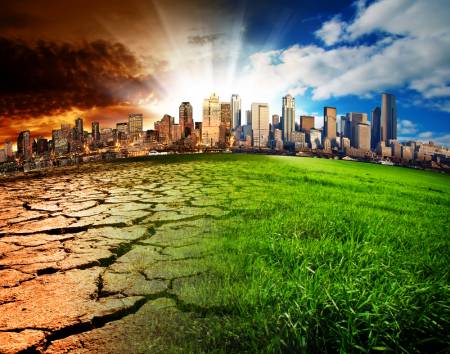
Tahseenullah
Climate change, a phenomenon driven primarily by human activities, particularly the release of greenhouse gases such as carbon dioxide (CO2), methane (CH4), and nitrous oxide (N2O) into the atmosphere, is causing long-term alterations in the Earth’s weather patterns. These changes encompass shifts in temperature, precipitation, and wind patterns, with repercussions that touch various aspects of our world.
One of the most direct consequences of climate change is the global rise in temperatures, driven by the greenhouse effect. This effect involves these gases trapping heat from the sun in the Earth’s atmosphere, creating a warmer environment. Consequently, we are witnessing more frequent and severe heatwaves, which pose significant health risks, particularly to the most vulnerable populations.
As temperatures continue to rise, glaciers and polar ice caps are melting, leading to a gradual increase in sea levels. This, in turn, results in coastal erosion, more frequent flooding, and the displacement of communities living along coastlines, who are now facing the imminent threat of losing their homes and livelihoods.
Climate change also exacerbates the intensity of extreme weather events. Hurricanes, cyclones, droughts, and wildfires are becoming more frequent and severe, resulting in the loss of lives, destruction of property, and economic turmoil for affected regions.
The shifting temperatures are disrupting ecosystems on a global scale. Species distribution, migration patterns, and the timing of natural events, known as phenology, are all being altered. This loss of biodiversity has far-reaching consequences, as it affects essential ecosystem services such as pollination and water purification.
Moreover, the increased levels of carbon dioxide (CO2) in the atmosphere are not limited to the air; they also find their way into the oceans. This leads to a phenomenon known as ocean acidification, which is detrimental to marine life, especially organisms with calcium carbonate shells and skeletons, such as corals and certain plankton species. These changes are threatening the delicate balance of marine ecosystems.
Climate change has the potential to disrupt agricultural patterns, impacting crop yields and food production. Changes in precipitation can lead to droughts, jeopardizing water availability and potentially inciting conflicts over resources as nations compete for dwindling supplies.
The consequences of climate change are not confined to the physical environment alone. Heat-related illnesses, respiratory problems stemming from air pollution, and the spread of diseases by vectors like mosquitoes can all increase in prevalence due to climate change. Furthermore, the psychological toll on individuals and communities affected by extreme weather events can be significant, leading to stress and trauma that can have long-lasting effects.
Economically, climate change poses substantial risks. Infrastructure damage from extreme weather events, reduced labor productivity due to heat stress, and higher insurance costs all take a toll on economies worldwide. The transition to a low-carbon economy may require significant investments in new technologies and infrastructure, which can also have economic implications.
Also read: Malam Jabba tree planting ceremony held to combat climate change
Additionally, rising sea levels and the escalation of extreme weather events can force people to abandon their homes, resulting in climate-induced migration. This phenomenon can potentially exacerbate existing refugee crises and create new challenges for nations and regions grappling with an influx of displaced populations.
Finally, climate change has the potential to intensify conflicts over vital resources such as water and arable land. This could lead to regional and global security challenges as nations and communities contend for access to essential resources.
Given the far-reaching consequences of climate change, addressing this issue has become a global imperative. Taking action to reduce greenhouse gas emissions, transitioning to renewable energy sources, conserving natural habitats, and implementing sustainable agricultural practices are all crucial steps in mitigating the impacts of climate change and securing the future of our planet. It is a challenge that requires concerted effort and collaboration on a global scale to safeguard the well-being of current and future generations.
The author is associated with Khyber News as a news anchor.
Twitter @tahseentasir








